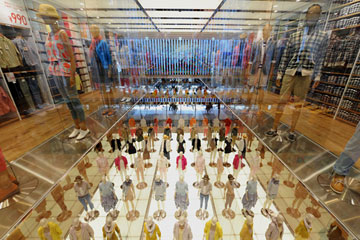
Uniqlo's flagship in Tokyo. The company aims to have 200 outlets in the U.S.
The strangeness of Tadashi Yanai is best appreciated in his natural element. Among the gray suits of corporate Japan, the head of Uniqlo stands out like beefsteak on a plate of sushi. In a business culture where senior executives tend to speak in soft monotones, stick to carefully vetted talking points and shuffle uncomfortably at personal questions, Yanai, 64, is as colorful as the T-shirts and sweaters in his stores. Talking so loudly that he drowns out his translator, Yanai is bracingly blunt on subjects ranging from the state of the Japanese economy ("We are on the edge of a cliff") to the lackadaisical attitude of the country's youth ("The younger generation relies too much on their parents"). He dresses casually in a plaid shirt and brown pants--his own label, natch--and underlines his brand loyalty by unbuttoning himself mid-interview to show his Uniqlo underwear.
The personal exposure is part of his shtick: Yanai has displayed his underwear to journalists before. But his idiosyncrasy is genuine, and it is key to understanding how Yanai has transformed his family's tiny clothing stores into an international colossus with outlets from London's Oxford Street to Shanghai's West Nanjing Road to New York City's Fifth Avenue. Fast Retailing, Uniqlo's parent company, isn't as big as some of its competitors, such as the Gap and Spain's Inditex, which owns Zara, but it is catching up. While sales at the Gap have remained almost unchanged over the past decade, Fast Retailing's have tripled to $11.8 billion, propelling Yanai into the ranks of Asia's richest people.
How has Uniqlo managed to sneak up on long-established rivals during a global economic slowdown? It's not just about low prices and marquee stores: walk a block or so to either side of its Fifth Avenue store and you can buy a cheap T-shirt at the Gap or H&M. On a recent afternoon, shoppers emerging from the Uniqlo store told TIME they were drawn by the Japanese brand's reputation for innovative textile technology. "I could have got this color from Marks & Spencer," said Kasturi Nagarajan, a software engineer visiting from New Delhi, as he fished out what looked like a white standard men's polo shirt. "But I've got two of these at home, and I know they dry quicker and don't stain as much as my other shirts."
Much of Uniqlo's advertising talks up the technology woven into its fabrics. A top-selling item is a down coat thick enough to ward off chilly temperatures but thin enough to crunch into a small bag. Fast Retailing has also developed special fabrics, including a light but insulating material called Heattech, which is fashioned into undershirts and other clothing, and a stretchy cloth for its AIRism line, formulated to be cool on hot days. "The sense of matching engineering with design--that's what makes them special," says Candace Corlett, president of New York City--based consultancy WSL Strategic Retail.
Prophet of the Loom
